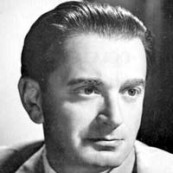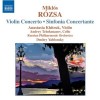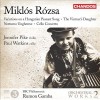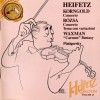Composers
Miklós Rózsa or Miklos Rozsa (18 April 1907 – 27 July 1995) was a Hungarian-born composer and conductor, best known for his numerous film scores. Along with such composers as Bernard Herrmann, Erich Wolfgang Korngold, Alfred Newman, Max Steiner and Franz Waxman, Rózsa is considered to be one of the "founding fathers of film music.
Rózsa was one of the most respected and popular composers working in Hollywood. He is also regarded today as one of the greatest film score composers of all time. In a career that spanned over fifty years, he composed music for nearly 100 films, including Spellbound (1945), Quo Vadis (1951), Ben-Hur (1959), and King of Kings (1961).
Rózsa is one of the most nominated composers in Oscar history: he had 16 nominations and three Oscars. He also had three Golden Globe nominations, and a Grammy Award nomination for the MGM Records album of Ben-Hur.
Miklós Rózsa was born in Budapest and was introduced to classical and folk music by his mother, a classical pianist who had studied with pupils of Franz Liszt, and his father, a well-to-do industrialist and landowner who loved Hungarian folk music. He began to study the violin at age 5 and later the viola and piano. By age 8 he was performing in public and composing. He also collected folksongs from the area where his family had a country estate north of Budapest in an area inhabited by the Palóc Hungarians.
Rózsa, who did not enjoy life in Budapest, moved to Leipzig, ostensibly to study chemistry. However, with a career as a composer in mind he enrolled at the Leipzig Conservatory, where he studied composition with Hermann Grabner, a former student of Max Reger.
Rózsa's first two published works, the String Trio, Op. 1, and the Piano Quintet, Op. 2, were published in Leipzig. In 1929 he received his diplomas cum laude. For a time he remained in Leipzig as Grabner's assistant, but at the suggestion of the French organist and composer Marcel Dupré, he moved to Paris in 1932.
In Paris, Rózsa composed classical music, including his Hungarian Serenade for small orchestra, Op. 10 (later revised and renumbered as Op. 25) and the Theme, Variations, and Finale, Op. 13, which was especially well received and was performed by conductors such as Charles Munch, Karl Böhm, Georg Solti, Eugene Ormandy, and Leonard Bernstein.
Rózsa was introduced to film music in 1934 by his friend, the Swiss-born composer Arthur Honegger. Following a concert which featured their respective compositions, Honegger mentioned that he supplemented his income as a composer of film scores, including Les Misérables. Rózsa went to see it and was greatly impressed by the opportunities the motion picture medium offered.
However, it was not until Rózsa moved to London that he was hired to compose his first film score, that for the film Knight Without Armour, produced by his fellow Hungarian Alexander Korda. After his next score, for Thunder in the City, he joined the staff of Korda's London Films.
In 1939 Rózsa travelled with Korda to Hollywood to complete the work on The Thief of Bagdad. The film earned him his first Academy Award nomination. A further two followed in 1940 for his scores to Lydia and Sundown. In 1943 he received his fourth nomination for Korda's Jungle Book.
In 1944, Rózsa scored Double Indemnity, the first of several collaborations with acclaimed director Billy Wilder. This score, and that for Woman of the Town, earned him Academy Award nominations in the same year. The Oscar, however, was won by Max Steiner for Since You Went Away.
In 1945 Rózsa was hired to compose the score for Alfred Hitchcock's film Spellbound, after Bernard Herrmann became unavailable due to other commitments. The score, notable for pioneering the use of the theremin, was immensely successful and earned him his first Oscar. However, Hitchcock disliked the score, saying it "got in the way of his direction". Two of his other scores, The Lost Weekend and A Song to Remember, were also nominated that year. Rózsa, who also reportedly hated the interruptions and interference by producer David O Selznick, never worked for either Hitchcock or Selznick again.
Rózsa earned another Oscar nomination for scoring The Killers (1946). He received his second Oscar the following year for A Double Life. In 1947 he and Eugene Zador orchestrated music by Nikolai Rimsky-Korsakov for the film Song of Scheherazade, about a fictional episode in the composer's life. Rózsa also wrote original music for the film.
Madame Bovary (1949) was Rózsa's first score for Metro-Goldwyn-Mayer, which produced most of the future films that he scored. Other popular scores that he composed for MGM pictures include Quo Vadis (1951), Ivanhoe (1952), Ben-Hur, King of Kings and The V.I.P.s. For Ben-Hur he received his third and final Oscar. His final two nominations (one each for Best Original Score and Best Original Song) were for the Samuel Bronston film El Cid.
In 1968 Rózsa was asked to score The Green Berets, after Elmer Bernstein turned it down due to his political beliefs. Rózsa initially declined the offer, saying, "I don't do westerns." However, he agreed to compose the score after being informed, "It's not a Western, it's an 'Eastern'." He produced a strong and varied score, which included a night club vocal by a Vietnamese singer Bạch Yến. However, one cue which incorporated stanzas of "Onward Christian Soldiers" was deleted from the final edit of the film.
Rózsa's last film score was for Dead Men Don't Wear Plaid (1982). The film is also notable for being the final project of famed costume designer Edith Head. Although Rózsa's career as a composer for films ended following a stroke he suffered while on holiday in Italy later that year, he continued to compose various concert pieces thereafter. He returned to California at the behest of his son, and remained sequestered at his home for the remainder of his life.
Rozsa died on 27 July 1995 and is buried at Forest Lawn in the Hollywood Hills.
Recently Added
Biography
Miklós Rózsa or Miklos Rozsa (18 April 1907 – 27 July 1995) was a Hungarian-born composer and conductor, best known for his numerous film scores. Along with such composers as Bernard Herrmann, Erich Wolfgang Korngold, Alfred Newman, Max Steiner and Franz Waxman, Rózsa is considered to be one of the "founding fathers of film music.
Rózsa was one of the most respected and popular composers working in Hollywood. He is also regarded today as one of the greatest film score composers of all time. In a career that spanned over fifty years, he composed music for nearly 100 films, including Spellbound (1945), Quo Vadis (1951), Ben-Hur (1959), and King of Kings (1961).
Rózsa is one of the most nominated composers in Oscar history: he had 16 nominations and three Oscars. He also had three Golden Globe nominations, and a Grammy Award nomination for the MGM Records album of Ben-Hur.
Miklós Rózsa was born in Budapest and was introduced to classical and folk music by his mother, a classical pianist who had studied with pupils of Franz Liszt, and his father, a well-to-do industrialist and landowner who loved Hungarian folk music. He began to study the violin at age 5 and later the viola and piano. By age 8 he was performing in public and composing. He also collected folksongs from the area where his family had a country estate north of Budapest in an area inhabited by the Palóc Hungarians.
Rózsa, who did not enjoy life in Budapest, moved to Leipzig, ostensibly to study chemistry. However, with a career as a composer in mind he enrolled at the Leipzig Conservatory, where he studied composition with Hermann Grabner, a former student of Max Reger.
Rózsa's first two published works, the String Trio, Op. 1, and the Piano Quintet, Op. 2, were published in Leipzig. In 1929 he received his diplomas cum laude. For a time he remained in Leipzig as Grabner's assistant, but at the suggestion of the French organist and composer Marcel Dupré, he moved to Paris in 1932.
In Paris, Rózsa composed classical music, including his Hungarian Serenade for small orchestra, Op. 10 (later revised and renumbered as Op. 25) and the Theme, Variations, and Finale, Op. 13, which was especially well received and was performed by conductors such as Charles Munch, Karl Böhm, Georg Solti, Eugene Ormandy, and Leonard Bernstein.
Rózsa was introduced to film music in 1934 by his friend, the Swiss-born composer Arthur Honegger. Following a concert which featured their respective compositions, Honegger mentioned that he supplemented his income as a composer of film scores, including Les Misérables. Rózsa went to see it and was greatly impressed by the opportunities the motion picture medium offered.
However, it was not until Rózsa moved to London that he was hired to compose his first film score, that for the film Knight Without Armour, produced by his fellow Hungarian Alexander Korda. After his next score, for Thunder in the City, he joined the staff of Korda's London Films.
In 1939 Rózsa travelled with Korda to Hollywood to complete the work on The Thief of Bagdad. The film earned him his first Academy Award nomination. A further two followed in 1940 for his scores to Lydia and Sundown. In 1943 he received his fourth nomination for Korda's Jungle Book.
In 1944, Rózsa scored Double Indemnity, the first of several collaborations with acclaimed director Billy Wilder. This score, and that for Woman of the Town, earned him Academy Award nominations in the same year. The Oscar, however, was won by Max Steiner for Since You Went Away.
In 1945 Rózsa was hired to compose the score for Alfred Hitchcock's film Spellbound, after Bernard Herrmann became unavailable due to other commitments. The score, notable for pioneering the use of the theremin, was immensely successful and earned him his first Oscar. However, Hitchcock disliked the score, saying it "got in the way of his direction". Two of his other scores, The Lost Weekend and A Song to Remember, were also nominated that year. Rózsa, who also reportedly hated the interruptions and interference by producer David O Selznick, never worked for either Hitchcock or Selznick again.
Rózsa earned another Oscar nomination for scoring The Killers (1946). He received his second Oscar the following year for A Double Life. In 1947 he and Eugene Zador orchestrated music by Nikolai Rimsky-Korsakov for the film Song of Scheherazade, about a fictional episode in the composer's life. Rózsa also wrote original music for the film.
Madame Bovary (1949) was Rózsa's first score for Metro-Goldwyn-Mayer, which produced most of the future films that he scored. Other popular scores that he composed for MGM pictures include Quo Vadis (1951), Ivanhoe (1952), Ben-Hur, King of Kings and The V.I.P.s. For Ben-Hur he received his third and final Oscar. His final two nominations (one each for Best Original Score and Best Original Song) were for the Samuel Bronston film El Cid.
In 1968 Rózsa was asked to score The Green Berets, after Elmer Bernstein turned it down due to his political beliefs. Rózsa initially declined the offer, saying, "I don't do westerns." However, he agreed to compose the score after being informed, "It's not a Western, it's an 'Eastern'." He produced a strong and varied score, which included a night club vocal by a Vietnamese singer Bạch Yến. However, one cue which incorporated stanzas of "Onward Christian Soldiers" was deleted from the final edit of the film.
Rózsa's last film score was for Dead Men Don't Wear Plaid (1982). The film is also notable for being the final project of famed costume designer Edith Head. Although Rózsa's career as a composer for films ended following a stroke he suffered while on holiday in Italy later that year, he continued to compose various concert pieces thereafter. He returned to California at the behest of his son, and remained sequestered at his home for the remainder of his life.
Rozsa died on 27 July 1995 and is buried at Forest Lawn in the Hollywood Hills.






